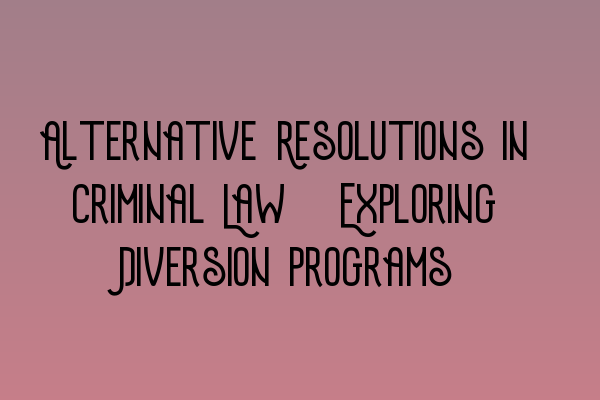Alternative Resolutions in Criminal Law: Exploring Diversion Programs
When it comes to the criminal justice system, the focus is often on punishment and incarceration. However, there are alternative resolutions available that aim to divert individuals away from traditional court processes and towards rehabilitation and support. In this article, we will explore the concept of diversion programs and their importance in criminal law.
What are Diversion Programs?
Diversion programs are alternative resolutions offered to certain individuals accused of committing crimes. These programs aim to address the root causes of criminal behavior and provide offenders with resources and support to make positive changes in their lives. Rather than going through the traditional court process, individuals who are eligible for diversion programs can have their charges dropped or reduced upon successful completion of the program.
There are various types of diversion programs available, including:
- Pre-Trial Diversion Programs: These programs are offered prior to trial and are designed to divert individuals away from the criminal justice system. Participants may undergo counseling, treatment programs, or community service as a way to address the underlying issues that led to their involvement in criminal activity.
- Post-Conviction Diversion Programs: These programs are available after a conviction has occurred. Instead of serving traditional sentences, eligible individuals can participate in rehabilitation programs to address the root causes of their criminal behavior. Successful completion of the program may result in reduced or modified sentences.
The Benefits of Diversion Programs
Diversion programs offer several benefits, both for individuals accused of crimes and for society as a whole. Some of these benefits include:
- Rehabilitation: Diversion programs prioritize rehabilitation over punishment. By addressing the underlying issues contributing to criminal behavior, individuals have the opportunity to make positive changes and reintegrate into society.
- Reduced Recidivism: Studies have shown that diversion programs can effectively reduce recidivism rates. By providing individuals with the necessary support and resources, the likelihood of them reoffending decreases.
- Cost Savings: Diversion programs are often more cost-effective than traditional court processes. They help reduce the strain on the criminal justice system and can save taxpayer money by avoiding costly trials and incarcerations.
Conclusion
Diversion programs play a vital role in the criminal justice system by offering alternative resolutions to individuals accused of crimes. These programs prioritize rehabilitation, reduce recidivism rates, and provide cost savings. By diverting individuals away from traditional court processes and towards support and rehabilitation, we can foster positive change and contribute to safer and healthier communities.
If you’re interested in learning more about criminal law and preparation for the SQE exams, check out our related articles:
- SQE 1 Practice Exam Questions
- SQE 1 Practice Mocks FLK1 FLK2
- SQE 2 Preparation Courses
- SQE 1 Preparation Courses
- SRA SQE Exam Dates
